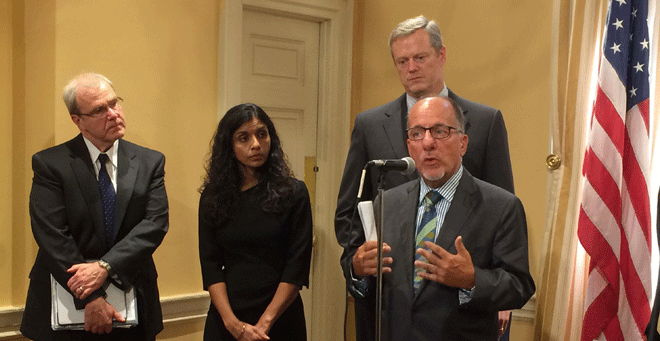 |
|
|
(L-R) Terence Flotte, MD, Monica Bharel, MD, MPH, and Gov. Baker listen as Dennis Dimitri, MD, speaks at the Sept. 2 press conference on opioid prescribing practices and training. |
All four Massachusetts medical schools are enhancing curricula to train future physicians how to prevent painkillers from being misused. The agreement between UMass Medical School, which has already taken a lead in efforts to curb the state’s opioid addiction and overdose epidemic, and the Boston University, Harvard University and Tufts University schools of medicine are part of Gov. Charlie Baker’s campaign to address the state’s opioid addiction problem, as reported by the Boston Globe on Nov. 9.
“What we’re seeing in the community suggests that there’s a problem in how many opiate doses are out there,” said UMass Medical School Provost and Dean Terence R. Flotte, who was interviewed for the story. “Whatever we’re doing now is not good enough.”
Dr. Flotte, the Celia and Isaac Haidak Professor of Medical Education, executive deputy chancellor, provost and dean of the School of Medicine, told the Globe that UMMS is immediately adding simulations with actors trained to perform as patients that will require the student to decide whether and how much opioid medication to prescribe to a patient complaining of pain. The School of Medicine will further assess its curriculum to see what additional instruction is needed, such as seminars for third- and fourth-year students transitioning into clinical rotations and internships.
The agreement between UMMS and the Boston, Tufts and Harvard University schools of medicine will ensure that all medical students receive formal training in all aspects of pain management and addiction.
Read the full story here.
Related links on UMassMedNow:
UMMS working with other Mass. medical schools, governor on opioid prescribing practices
Gov. Baker names UMMS pharmacy director to Opioid Drug Formulary Commission
Paul Jeffrey to Fox-TV 25 Boston: We must expand opioid abuse treatment, prevention
Key role for pharmacists in stemming opioid abuse crisis
Opioid prescribing education program offered for physicians, providers